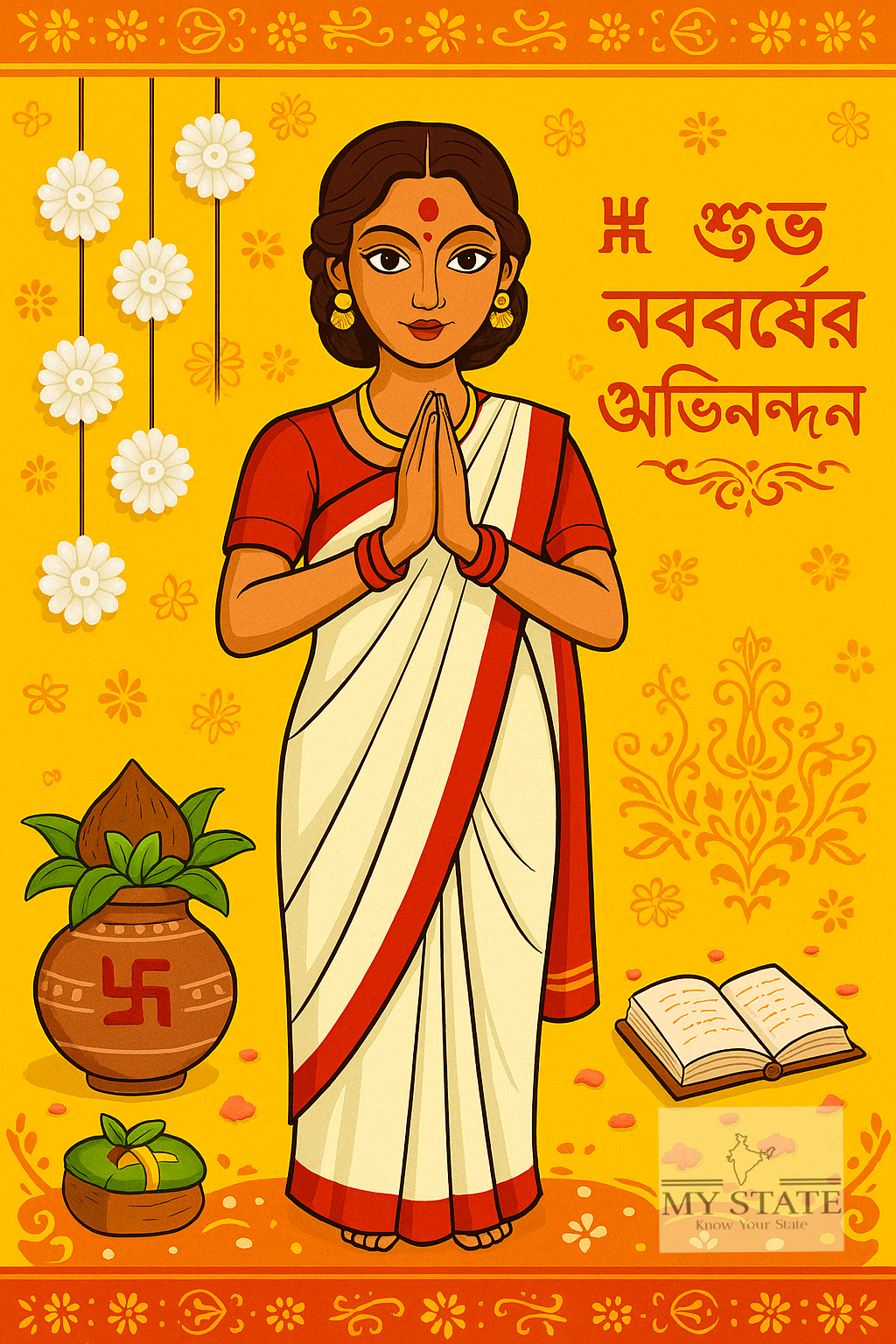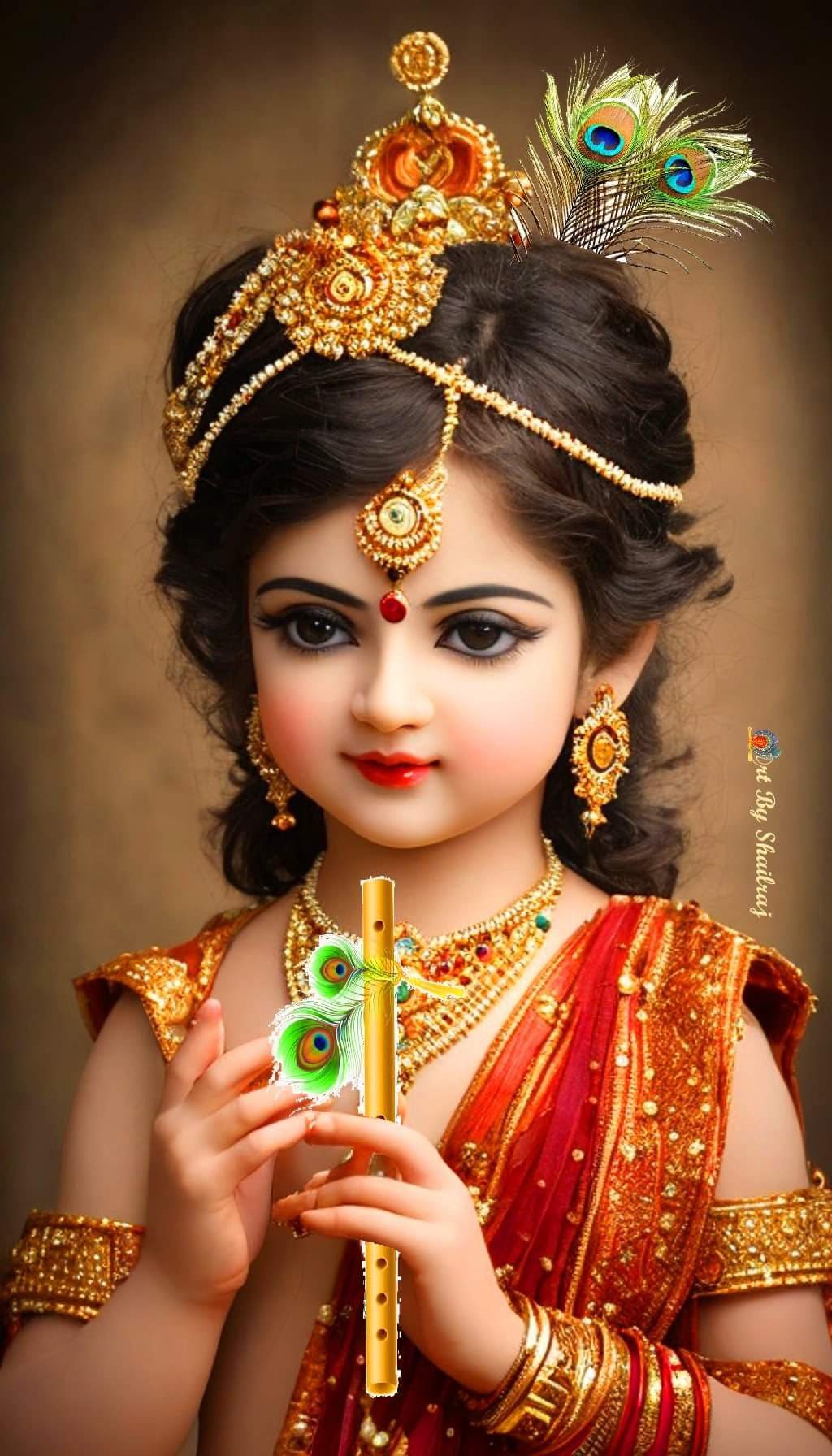🪔
শুভ নববর্ষ : এক বাঙালি ঐতিহ্যের উৎসব
শুভ নববর্ষের আন্তরিক শুভেচ্ছা। নতুন বছর আপনার জীবনে বয়ে আনুক সুখ, শান্তি ও সমৃদ্ধি।
ভূমিকা
শুভ নববর্ষ বা পয়লা বৈশাখ হল বাঙালির নতুন বছরের প্রথম দিন। এটি শুধুমাত্র একটি উৎসব নয়, বরং এটি আনন্দ, সংস্কৃতির গর্ব এবং আত্মিক নবজাগরণের এক গুরুত্বপূর্ণ দিন। পশ্চিমবঙ্গ এবং বাংলাদেশে এই দিনটি উল্লাস ও আবেগঘন পরিবেশে পালিত হয়, যা বাঙালিদের ঐতিহ্য ও পরিচয়ের প্রতিচ্ছবি।
ঐতিহাসিক প্রেক্ষাপট
পয়লা বৈশাখের উৎপত্তি ঘিরে দুটি ঐতিহাসিক দিক রয়েছে। একটি মত অনুযায়ী, প্রাচীন বঙ্গের রাজা শশাঙ্ক খ্রিস্টীয় ৫৯৪ সালের দিকে বাংলা সনের সূচনা করেন। অন্যদিকে, মোগল সম্রাট আকবর কৃষিনির্ভর কর ব্যবস্থাকে সহজ করতে বাংলা সনের ব্যবহার প্রাতিষ্ঠানিক রূপ দেন। এই দুই ঐতিহাসিক ঘটনার সম্মিলনে বাংলা সাল ও নববর্ষ আজকের রূপ পেয়েছে।
এই শুভ দিনে মানুষ প্রার্থনা করে একটি সমৃদ্ধ ও সফল ফসলের বছর কামনায়।
রীতি ও প্রথা
এই দিনে মানুষ ঘরবাড়ি পরিষ্কার করে, দরজায় আল্পনা আঁকে। নতুন পোশাক পরে, মন্দিরে গিয়ে প্রার্থনা করে মঙ্গল কামনায়। ব্যবসায়ীদের জন্য হাল খাতা একটি গুরুত্বপূর্ণ রীতি। ক্রেতাদের মিষ্টি ও উপহার দিয়ে আমন্ত্রণ জানানো হয়, পুরনো হিসাব-নিকাশ মিটিয়ে নতুন খাতা খোলা হয়।
সাংস্কৃতিক অনুষ্ঠান
এই দিন গান, নাচ ও কবিতায় মুখরিত থাকে। রবীন্দ্রনাথ ঠাকুরের “এসো হে বৈশাখ” গানটি চারিদিকে বেজে ওঠে। বাংলাদেশের মঙ্গল শোভাযাত্রা একটি ইউনেস্কো স্বীকৃত অনুষ্ঠান, যা শান্তি, সাম্য ও ঐক্যের প্রতীক।
খাবার ও উৎসব
মিষ্টি দই, ইলিশ মাছ সহ পান্তা ভাত, সন্দেশ, লুচি-আলুর দম – এগুলো এই দিনের অপরিহার্য খাবার। পরিবার ও বন্ধুরা একত্রিত হয়ে খাওয়া-দাওয়া করে, এবং অনেকে বৈশাখী মেলা উপভোগ করে যেখানে লোকসঙ্গীত, খেলা ও হস্তশিল্প থাকে।
আবেগ ও সাংস্কৃতিক তাৎপর্য
পয়লা বৈশাখ শুধুই উৎসব নয়—এটি পুরনোকে বিদায় জানিয়ে নতুনকে আলিঙ্গনের দিন। এটি আমাদের সংস্কৃতি ও পরিচয়কে স্মরণ করিয়ে দেয়, এবং বাংলা ভাষা ও ঐতিহ্যের প্রতি ভালোবাসা জাগিয়ে তোলে।
উপসংহার
শুভ নববর্ষ কেবল একটি নতুন বছরের উৎসব নয়; এটি এক ঐতিহ্যের উৎসব, যা বাংলার আত্মাকে ধারণ করে। প্রতিটি শুভেচ্ছার মধ্যে থাকে একটুকরো সংস্কৃতি, ইতিহাস ও গর্ব।
🪔 Subho Nababarsha : The Bengali New Year Celebration
Introduction
Subho Nababarsha, or Poila Boishakh, marks the first day of the Bengali New Year. It is more than just a celebration — it is a day of joy, cultural pride, and spiritual renewal. In both West Bengal and Bangladesh, this occasion is observed with great enthusiasm and heartfelt emotion, reflecting the vibrant heritage of the Bengali people.
Historical Background
There are two significant historical perspectives on the origin of the Bengali calendar. According to one, the calendar was introduced around 594 CE by King Shoshangko, a ruler of ancient Bengal. Another major contribution came later from Mughal Emperor Akbar, who institutionalized the Bengali calendar to simplify agricultural tax collection based on the harvest cycle. Together, these influences shaped what we now know as the Bengali calendar.
On this auspicious day, people offer prayers for a prosperous year and bountiful harvests.
Rituals and Traditions
People start the day by cleaning their homes and decorating entrances with alpana (traditional white rice flour art). They wear new clothes, visit temples, and offer prayers for prosperity and happiness. In business communities, “Hal Khata” (opening new account books) is a vital ritual. Customers are invited with sweets and gifts, and accounts are settled on this auspicious day.
Cultural Celebrations
The day is filled with music, dance, and poetry. Rabindranath Tagore’s songs, especially “Esho he Boishakh”, echo everywhere, bringing a sense of cultural nostalgia. In Bangladesh, the colorful Mangal Shobhajatra—a UNESCO-recognized procession organized by students—is a symbol of hope, peace, and unity.
Food and Festivities
Traditional delicacies like mishti doi, panta bhaat with ilish maach, shondesh, and luchi-alur dom are a must on this day. Families and friends gather to enjoy the feast, and many attend Boishakhi Melas (fairs) filled with folk music, games, and handicrafts.
Emotional and Cultural Significance
Poila Boishakh isn’t just about celebration—it is about letting go of the past, welcoming the new with hope and positivity. It is a reminder of our roots, traditions, and the shared Bengali identity that transcends borders.
Conclusion
Subho Nababarsha is not merely a New Year celebration; it is a festival that captures the soul of Bengal. With every ‘Shubho Nababarsha’ greeting, we share not just a wish, but a connection to a timeless tradition of joy, unity, and cultural pride.
🌟 Subho Nababarsha Wishes (Bengali & English)
📝 In Bengali:
-
শুভ নববর্ষের আন্তরিক শুভেচ্ছা। নতুন বছর আপনার জীবনে বয়ে আনুক সুখ, শান্তি ও সমৃদ্ধি।
-
পুরোনো সব দুঃখ ভুলে নতুনের আহ্বানে এগিয়ে চলুন। শুভ নববর্ষ!
-
এসো হে বৈশাখ! নতুন বছর হোক আশার, ভালোবাসার ও আনন্দের। শুভ নববর্ষ!
-
নতুন সকাল, নতুন বছর, নতুন স্বপ্ন – শুভ নববর্ষের প্রীতি ও শুভেচ্ছা।
-
শুভ হোক আপনার নতুন বছর, রাঙিয়ে উঠুক ভালোবাসা ও সাফল্যে।
📝 In English:
-
Wishing you a joyful and prosperous Subho Nababarsha! May this new year bring peace, love, and happiness.
-
Let go of the past, embrace the new with open arms. Happy Poila Boishakh!
-
Celebrate the beauty of tradition and the joy of new beginnings. Shubho Noboborsho!
-
May the new year be filled with light, laughter, and endless blessings.
-
Sending warm wishes for a vibrant and meaningful Bengali New Year!
❓ FAQs (Frequently Asked Questions)
1. What is Poila Boishakh?
Poila Boishakh is the first day of the Bengali calendar year, widely celebrated in West Bengal and Bangladesh.
2. When is Subho Nababarsha celebrated?
It usually falls on April 14 or 15 every year, depending on the solar calendar.
3. Who started the Bengali calendar?
The Bengali calendar is believed to have been initiated by King Shoshangko around 594 CE, later adapted and institutionalized by Emperor Akbar.
4. What are common traditions of Poila Boishakh?
Wearing new clothes, drawing alpana, visiting temples, performing Hal Khata, eating traditional food like panta ilish, and enjoying cultural programs.
5. How is it celebrated in Bangladesh vs West Bengal?
In Bangladesh, Mangal Shobhajatra is a major event. In West Bengal, fairs, Rabindra Sangeet, and rituals dominate the day.
#SubhoNababarsha #PoilaBoishakh #BengaliNewYear #ShubhoNoboborsho #BanglaNoboborsho #BengaliCulture #MangalShobhajatra #HalKhata #MishtiDoi #BoishakhiMela #BengaliTradition #NewYearWishes #BengaliFestival #RabindraSangeet #BanglaSanskriti
SubhoNababarsha ,PoilaBoishakh ,BengaliNewYear ,ShubhoNoboborsho ,BanglaNoboborsho ,BengaliCulture ,MangalShobhajatra ,HalKhata ,MishtiDoi ,BoishakhiMela ,BengaliTradition ,NewYearWishes ,BengaliFestival ,RabindraSangeet ,BanglaSanskriti
,শুভনববর্ষ ,পয়লাবৈশাখ ,বাংলানববর্ষ ,নববর্ষ২০২৫ ,বাঙালিঐতিহ্য ,বৈশাখীমেলা ,হালখাতা ,বাংলারউৎসব ,মিষ্টিদই ,ইলিশভাত ,রবীন্দ্রসংগীত ,মঙ্গলশোভাযাত্রা ,বাঙালিসংস্কৃতি ,নববর্ষেরশুভেচ্ছা ,বাঙালিরনতুনবছর
,হালখাতা ,মিষ্টিদই ,ইলিশভাত ,লুচিআলুরদম ,বৈশাখীবান্ধব ,রবীন্দ্রসংগীত ,এসোহেবৈশাখ ,মঙ্গলশোভাযাত্রা ,সাংস্কৃতিকঅনুষ্ঠান
,History of Bengali New Year
, How is Poila Boishakh celebrated?
,Subho Nababarsha wishes in Bengali
,Bengali New Year traditional food
,Cultural significance of Poila Boishakh
,Who started the Bengali calendar?
,Poila Boishakh celebrations in Bangladesh and West Bengal
Discover more from mystate.co.in
Subscribe to get the latest posts sent to your email.




শুভ হোক আপনার নতুন বছর, রাঙিয়ে উঠুক ভালোবাসা ও সাফল্যে।